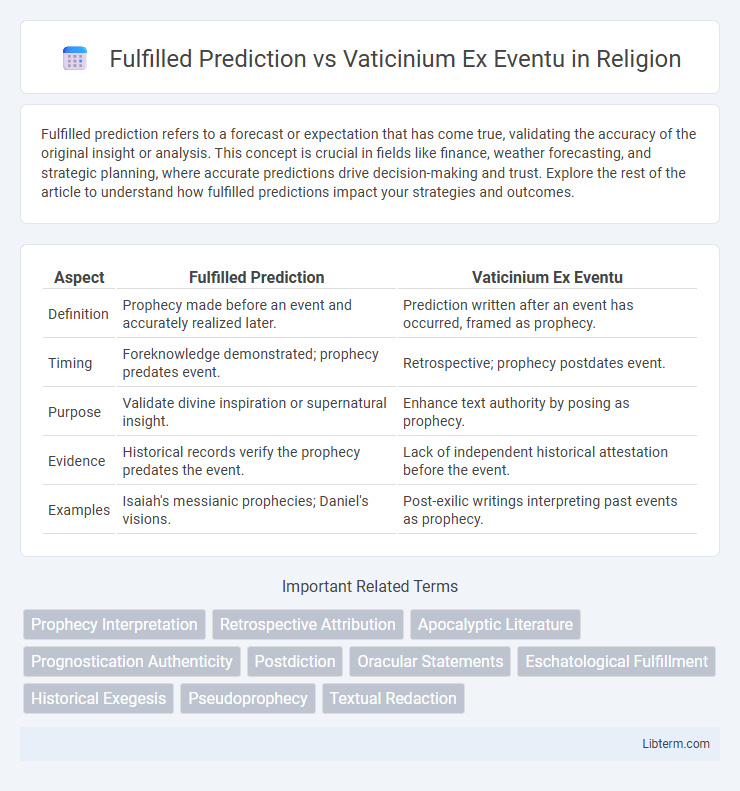Fulfilled prediction refers to a forecast or expectation that has come true, validating the accuracy of the original insight or analysis. This concept is crucial in fields like finance, weather forecasting, and strategic planning, where accurate predictions drive decision-making and trust. Explore the rest of the article to understand how fulfilled predictions impact your strategies and outcomes.
Table of Comparison
| Aspect | Fulfilled Prediction | Vaticinium Ex Eventu |
|---|---|---|
| Definition | Prophecy made before an event and accurately realized later. | Prediction written after an event has occurred, framed as prophecy. |
| Timing | Foreknowledge demonstrated; prophecy predates event. | Retrospective; prophecy postdates event. |
| Purpose | Validate divine inspiration or supernatural insight. | Enhance text authority by posing as prophecy. |
| Evidence | Historical records verify the prophecy predates the event. | Lack of independent historical attestation before the event. |
| Examples | Isaiah's messianic prophecies; Daniel's visions. | Post-exilic writings interpreting past events as prophecy. |
Understanding Fulfilled Prediction
Fulfilled prediction involves a prophecy or forecast that accurately anticipates a future event based on specific criteria or evidence, demonstrating a direct correlation between prediction and outcome. This concept contrasts with Vaticinium ex eventu, where prophecies are written after the events have occurred, making them retroactive interpretations rather than genuine forecasts. Understanding fulfilled prediction requires analyzing the chronological context and the precision of the prophecy in relation to the actual event.
Defining Vaticinium Ex Eventu
Vaticinium Ex Eventu refers to a prophecy written after the event it predicts, often crafted to appear as a genuine forecast. This technique contrasts with fulfilled prediction, where true foreknowledge is demonstrated by an accurate prophecy made before the event occurs. Understanding Vaticinium Ex Eventu is crucial for evaluating historical texts and discerning authentic prophecies from retroactive interpretations.
Key Differences Between the Two Concepts
Fulfilled prediction refers to a forecast made before an event that accurately comes true, demonstrating genuine foresight. Vaticinium ex eventu, or prophecy after the fact, involves creating a prediction following an event to give the illusion of foresight. The key difference lies in the timing and authenticity of the prediction, with fulfilled predictions being made prior to the event and vaticinium ex eventu being retroactively crafted.
Historical Examples of Fulfilled Predictions
Historical examples of fulfilled predictions include the accurate forecasting of the eruption of Mount Vesuvius in AD 79, recorded by Pliny the Younger, and the detailed prophecies of the Oracle at Delphi which were later interpreted as fulfilled events in ancient Greece. The prediction of the Battle of Hastings in 1066, chronicled by Norman sources, also exemplifies a fulfillment of prophecy rather than Vaticinium ex eventu. These cases highlight genuine instances where predictions preceded and accurately described future occurrences, contrasting with retrospectives that reinterpret past events as prophetic.
Notable Cases of Vaticinium Ex Eventu
Notable cases of vaticinium ex eventu include the accounts of the Trojan War in Homer's epics, which were written centuries after the events they describe, embedding hindsight into the narrative. Biblical prophecies, such as those in the Book of Daniel, have been interpreted as retroactive predictions shaped by historical outcomes rather than genuine foresight. These examples illustrate how authors often crafted prophecies to reflect known events, contrasting sharply with verified fulfilled predictions that occur without prior knowledge.
Literary and Religious Contexts
Fulfilled prediction refers to prophecies or forecasts whose events are realized as anticipated, often enhancing the authority and credibility of religious or literary texts. Vaticinium ex eventu, meaning "prophecy from the event," describes predictions written after the fact, creating the illusion of foresight and serving to legitimize narratives within sacred scriptures or classical literature. In both contexts, discerning genuine fulfilled prophecies from vaticinium ex eventu is crucial for understanding the historical reliability and theological intentions behind canonical writings.
Scholarly Debates and Controversies
Scholarly debates on fulfilled prediction versus vaticinium ex eventu focus on whether prophecies were genuinely predictive or retroactively written after events occurred. Critics argue that many biblical prophecies, such as those in the Book of Daniel or Isaiah, exhibit signs of vaticinium ex eventu, where texts were composed or edited post-event to appear prophetic. Proponents emphasize linguistic, historical, and archaeological evidence supporting genuine foreknowledge, highlighting ongoing controversies in biblical scholarship regarding authenticity and interpretative methodologies.
Implications for Interpretation of Texts
Fulfilled prediction involves accurate foresight documented prior to events, enhancing the credibility and persuasive power of texts within religious or literary contexts. Vaticinium ex eventu refers to predictions written after an event has occurred, often undermining the authenticity and reliability of the source. Distinguishing between these concepts is critical for textual interpretation, impacting historical accuracy assessments and the evaluation of prophetic legitimacy.
Identifying Genuine Prophecy vs. Retrospective Creation
Distinguishing fulfilled prediction from vaticinium ex eventu involves evaluating the temporal relationship between prophecy and event, ensuring the prophecy predates the occurrence to confirm genuine foresight. Authentic prophecies typically contain specific, detailed elements that are not easily generalizable or retrofitted, unlike retrospective creations crafted after the fact to appear predictive. Linguistic analysis and historical context assist scholars in verifying the originality and timing of prophetic texts, thereby separating true prophetic insight from post-event fabrications.
The Role in Modern Critical Analysis
Fulfilled prediction involves forecasting events before they occur, providing verifiable outcomes that enhance historical credibility through temporal accuracy. Vaticinium ex eventu refers to retroactive predictions made after an event, weakening reliability due to the influence of known outcomes on the narrative. Modern critical analysis emphasizes distinguishing these to assess source authenticity, textual integrity, and the validity of prophetic claims in historical and religious studies.
Fulfilled Prediction Infographic

 libterm.com
libterm.com